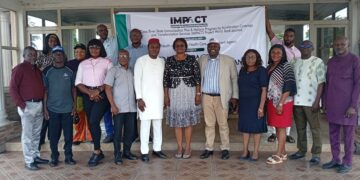By Asuquo Cletus
The Cross River State Government has commenced the development of its 2026 health work plan aimed at strengthening primary healthcare and improving access to quality medical services across the state.
The plan is being developed under the World Bank assisted IMPACT Project (Immunization Plus and Malaria Progress by Accelerating Coverage and Transformation Services) in collaboration with the State Ministry of Health and the Primary Health Care Development Agency, with the objective of reviewing ongoing interventions and designing strategies to accelerate service delivery in 2026.
Speaking during the three-day retreat in Calabar, the Project Manager of the Cross River State IMPACT Project, Dr. Paul Odey, explained that the meeting was convened at the directive of the World Bank to enable participating states to evaluate their 2025 performance, identify challenges, and develop realistic plans for the coming year.
He said the project, which began in Cross River in 2024 after the provision of counterpart funding by the state government, focuses on strengthening immunization and malaria services across all 18 local government areas and 196 wards in the state.
Dr. Odey disclosed that although Cross River joined the program later than other states, it has recorded significant progress, matching the achievements of states that started earlier. “We have reached all 18 local governments and are currently revitalizing and upgrading several primary healthcare facilities from level one to level two to enhance service delivery,” he stated.
Declaring the session open, the State Commissioner for Health, Dr. Henry Ayuk, commended the collaborative spirit among health managers and charged participants to ensure the plan reflects practical and achievable targets. He emphasized the need for teamwork, transparency, and prudent use of funds to guarantee effective service delivery to the people.
Dr. Ayuk noted that the World Bank’s decision to extend the IMPACT Project beyond 2025 offers the state an opportunity to consolidate its progress and expand the reach of primary healthcare interventions. He urged the team to “make realistic budgets and achievable plans” that would directly benefit communities, particularly at the grassroots level.
“Let us take full advantage of this extension to achieve as much as we can. This project is a loan, not a grant, so we must make the most of it to impact lives positively,” the commissioner said.
Also speaking, the Director General of the Cross River State Primary Health Care Development Agency, Dr. Vivien Otu, described the retreat as a crucial step in aligning state-level activities with national health priorities. She explained that the session was organized in response to directives from the World Bank, which urged participating states to review their 2025 performance and prepare a realistic 2026 work plan ahead of submission to the State Steering Committee.
Dr. Otu reaffirmed the state’s commitment to efficient project implementation and praised Governor Senator Prince Bassey Otu for providing the needed counterpart funding that enabled the project’s successful takeoff.
The retreat provided an avenue for stakeholders to review achievements, identify challenges, and adopt new strategies for enhancing immunization coverage, malaria control, and primary healthcare revitalization in Cross River State.
The IMPACT Project, supported by the World Bank, focuses on strengthening health systems through improved immunization coverage, malaria prevention, and efficient healthcare delivery across participating states.











